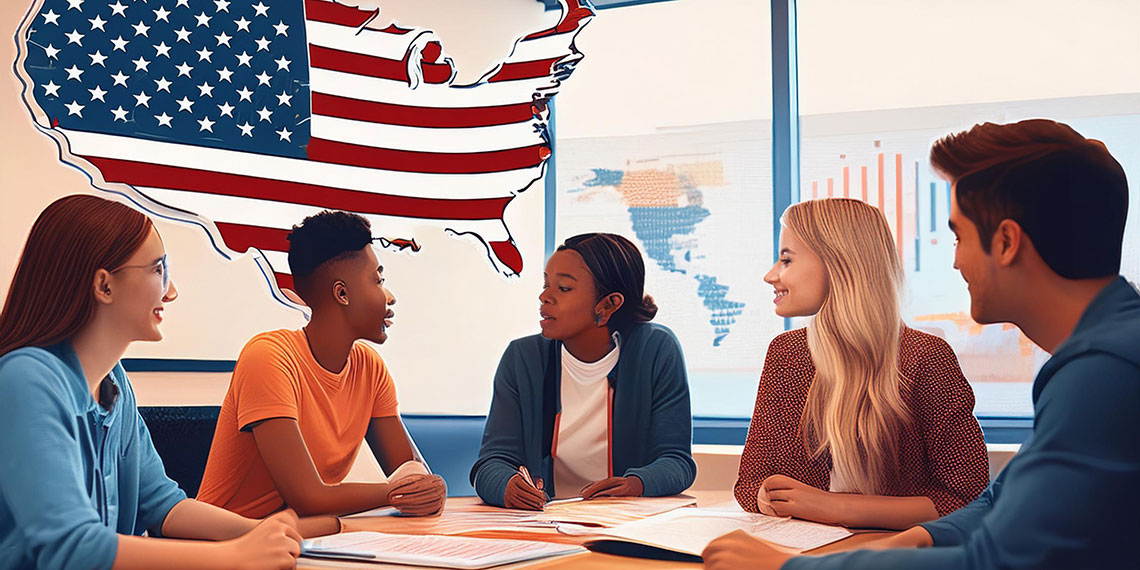Encouraging Engagement
Rebecca Donaway in communication studies and Sarah James in political science are using election season to explore civil dialogue and collaboration

When college students across the nation return to fall classes, they’re doing so in a volatile political environment.
The Gaza conflict that sparked campus protests nationally continues. During summer break, the Republican Party’s presidential nominee was convicted of 34 felonies and survived an assassination attempt. And the Democratic Party’s planned nominee quit the race and was replaced on the ticket by his vice president. These are definitely unprecedented times.
Faculty across Gonzaga will have classrooms full of students engaging with the thorny questions of the day. Two in particular, Rebecca Donaway in communication studies and Sarah James in political science, are using election season as an opportunity to explore civil dialogue , teach about campaigns and political communication, and collaborate in a unique approach that taps both their areas of expertise.
Donaway’s course, “Communication and Democracy,” will focus on areas including the role of communication in a democracy, the media’s influence, and how to encourage open-minded dialogue.
She notes that Americans don’t have many good role models for what political discussion could look like when done positively. Mostly we see snarky comments online. “Those things don’t help us understand the other side,” Donaway said. “And if we want to get things done with people who disagree with us, we have to have some idea of where they’re coming from, what they value.”
James’ course, “Campaigns and Voting in U.S. Elections,” covers key aspects of elections, from how they work to the various players involved (candidates, lobbyists, grassroots movements, etc.). James notes that she teaches often on issues of race, education, inequality and public policy, so her classes “inherently kind of pull on contemporary events.”
James is looking forward to sharing her perspectives in Donaway’s class and vice versa throughout the semester, collaborating on discussions formed around what’s happening in the campaign.
“She and I have kind of aligned research interests, and also have different expertise,” James says. “So why not take advantage of that and cross over? This could be an interesting way of leveraging expertise.”

Giving Gen Z Space to Open Up
Both Donaway and James mention leaning into Gonzaga’s Jesuit, humanistic mission as encouraging an open exchange of ideas, a place where their students will feel safe discussing hot-button issues.
For some students, James says, there’s a sense of fear around some political discussions, that there are issues too “dangerous” to talk about. Growing up in politically divisive times, these students have seen plenty of people “cancelled” or ridiculed online for saying the “wrong” thing.
Donaway’s research shows that many students are talking about politics, but they’re doing it privately, not in the comment section of a news story. They are reserved, Donaway says, and any time something even remotely provocative or controversial comes up in class, they’re scanning the room to see if it’s okay to engage.
While controversial issues will be part of her class, the focus is on the response to information and how information flows rather than on the issues themselves, Donaway adds. That will give the class some detachment from whether students agree or disagree and “lets us kind of do the work.”
“I think students need a little experience feeling like they can talk about a thing without it blowing up in their faces,” Donaway says.
It's also important, Donaway notes, for many students who will be personally involved in an election for the first time to feel comfortable discussing topical issues.
“It’s kind of cool to accompany them through their first round of voting,” Donaway says. “Students 18 to 24, it’s considered really important in cementing civic behaviors, the idea that ‘I’m a person who votes. I show up and turn in my ballot, I read the news,’ all those things are really influenced by what happens at this age.”
Students in Donaway’s class will be watching debates and speeches, examining ads, reading traditional news and tracking social media accounts. All of that will feed into classroom dialogue.
“One of the big projects will be for students to engage, two or three times throughout the semester, in a 10-minute dialogue session with somebody who disagrees with them,” Donaway says.
Those dialogues might get heated, and people might get upset, but that will open up opportunities for reflection and addressing questions like “What was hard about that?” and “Why is that kind of dialogue impossible on the internet?”
“I try to talk about the work we are doing connecting to the mission,” Donaway says. “You came to a place that said you care about service and leadership for the common good, and you can’t do either of those things if you can’t talk to the person right next to you.”
James says working at an institution like Gonzaga helps her encourage civil discourse on difficult topics.
“It’s really refreshing and exciting to be able to really, honestly, start a class and say, hey, I don’t know how many of you made a choice to be here based on the mission, but you’re in an institution that believes this stuff,” James says. ”And I’m here because I believe in this stuff. So we are going to take seriously in this class that caring for the vulnerable and caring for the climate is important. We can disagree fundamentally about how we do that, or whose responsibility it is, but what we’re not going to do is question that it’s important.”
“There’s a lot of discourse in the media right now about young people feeling disenchanted,” James adds. “They genuinely feel an uncertainty about the future, and a lack of familiarity with and fear of discussing the past. My hope is that our classes give them a space to start to tackle some of that.”
- Academics
- Diversity & Inclusion
- Faith & Mission
- Student Life
- College of Arts & Sciences
- Communication Studies
- Political Science
